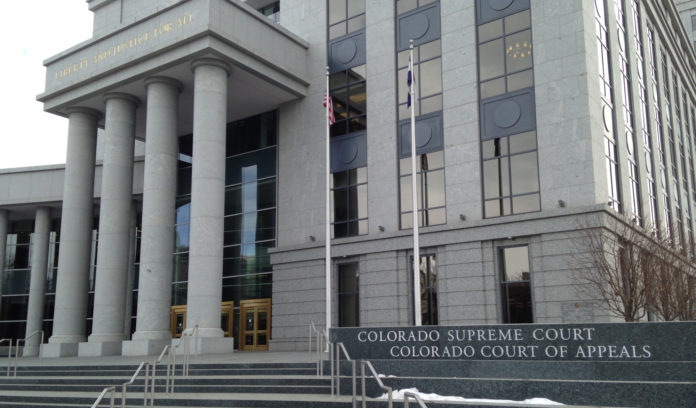

The Colorado Supreme Court on Monday ruled that a plaintiff may not sue an individual insurance claims adjuster under the state’s bad faith insurance statutes, resolving tension in Colorado case law and bringing relief to insurers and business groups.
Colorado’s bad faith statutes state that a “person engaged in the business of insurance” shall not unreasonably delay or deny the payment of benefits, and a policyholder may sue if a claim is unreasonably delayed or denied. The question before the court was whether “a person engaged in the business of insurance” includes the insurance company employee who denied the claim.
Alexis Skillett filed a claim with her insurer, Allstate, for underinsured motorist benefits following a car accident in 2020. Claims adjuster Collin Draine denied it. Skillett sued Allstate for breach of contract and bad faith and sued Draine personally for statutory bad faith.
Allstate contended that Colorado’s bad faith statutes don’t allow plaintiffs to sue an insurance company employee who is not a party to the insurance policy. Allstate and Draine asked the federal court handling the case to pass the question to the Colorado Supreme Court: Can a claims adjuster be personally liable for statutory bad faith in Colorado?
In his order certifying the question, U.S. Magistrate Judge Michael Hegarty of the U.S. District Court of Colorado said the state Supreme Court’s answer could clear up contradictions in case law.
In the 2013 decision in Riccatone v. Colorado Choice Health Plans, a division of the Colorado Court of Appeals found only an insurer may be sued — not an individual employee of an insurance company. But in 2020, the U.S. District Court for the District of Colorado concluded in Seiwald v. Allstate that the statutes could be interpreted to allow a lawsuit against an insurance adjuster. Since Seiwald, there has been an increase in lawsuits naming individual claims adjusters, according to Hegarty. The state Supreme Court agreed to answer the question.
Skillett argued that the plain language of the statutes shows claims may be brought against individual insurance adjusters since they are “person[s] engaged in the business of insurance.” The word “person” is defined elsewhere in state insurance law to include individuals, including adjusters, Skillett contended.
Allstate countered that Skillett’s interpretation is based on a “selective” and “incomplete” review of the statutes. The state legislature intended to scrutinize the insurer’s actions and hold the insurer accountable by imposing statutory damages, according to the insurance company.
Draine argued that because employee adjusters are not parties to the insurance policy and owe no duty to pay contract benefits personally, they have no personal liability under the statutes. “Plaintiff’s complicated argument regarding the meaning of the term ‘person’ has no effect on this conclusion,” Draine’s answer brief states.
Draine also raised policy concerns about Skillett’s interpretation. Holding adjusters personally liable would create conflicts of interest between insurers and their employees, according to Draine, and a “new category of lawsuits” against employees will burden insurers and the public with costs.
The Colorado Supreme Court concluded the statutes only allow plaintiffs to sue the insurer. The statutes specify that “an insurer’s delay or denial was unreasonable if the insurer delayed or denied authorizing payment” of benefits, the court noted, creating a standard for the insurer’s conduct. However, the statutes offer no guidance on what “unreasonable” conduct by an adjuster would be. Additionally, only insurers may authorize payment, not employees. “Reading these provisions to allow for adjuster liability leaves unnecessary statutory gaps,” the high court concluded.
The ruling likely comes as a relief to the more than half-dozen business and insurance groups that filed amicus briefs supporting Draine and Allstate. The U.S. Chamber of Commerce said in a brief that “suing adjusters is a cynical ploy to terrorize individual employees and thereby attempt to exert unfair settlement leverage.” Recognizing personal liability for adjusters could also lead to a “slippery slope” allowing lawsuits against other individuals involved in insurance claim investigations, including medical examiners, attorneys and accident investigators, the organization argued.
“Insurance adjusters and other investigators are on the front lines of the fight against fraud, making often difficult daily decisions about which claims are properly supported and which require additional investigation,” the Coalition Against Insurance Fraud stated in an amicus brief. Insurance companies should bear the costs and risks of the choices their employees must make, the group said, since the companies control and train their employees and are required to have the funds to cover court judgments.
“The prospect of frequent personal litigation, with its attendant unpleasantness and expense, will also make it more difficult to recruit and retain skilled employees, in turn raising costs and premiums,” the CAIF’s brief states.

